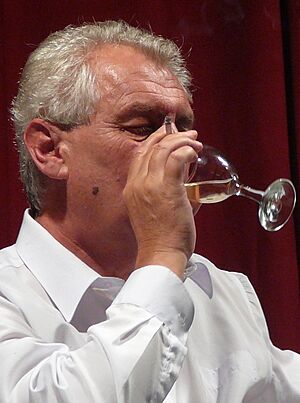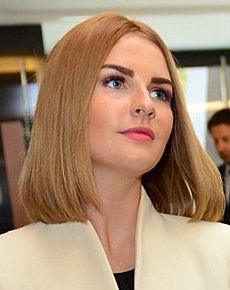Miloš Zeman facts for kids
Quick facts for kids
Miloš Zeman
|
|
|---|---|
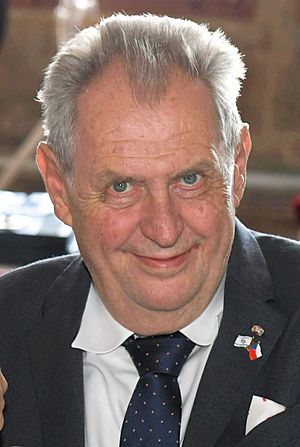
Zeman in 2022
|
|
| 3rd President of the Czech Republic | |
| In office 8 March 2013 – 8 March 2023 |
|
| Prime Minister | Petr Nečas Jiří Rusnok Bohuslav Sobotka Andrej Babiš Petr Fiala |
| Preceded by | Václav Klaus |
| Succeeded by | Petr Pavel |
| Prime Minister of the Czech Republic | |
| In office 17 July 1998 – 15 July 2002 |
|
| President | Václav Havel |
| Preceded by | Josef Tošovský |
| Succeeded by | Vladimír Špidla |
| President of the Chamber of Deputies | |
| In office 27 June 1996 – 17 July 1998 |
|
| Preceded by | Milan Uhde |
| Succeeded by | Václav Klaus |
| Leader of the Social Democratic Party | |
| In office 28 February 1993 – 7 April 2001 |
|
| Preceded by | Jiří Horák |
| Succeeded by | Vladimír Špidla |
| Personal details | |
| Born | 28 September 1944 Kolín, Protectorate of Bohemia and Moravia (now Czech Republic) |
| Political party | Communist Party (1968–1970) Civic Forum (1990–1991) Civic Movement (1991–1992) Social Democratic Party (1992–2007) Independent (2007–2009, 1970–1990) Party of Civic Rights (2009–2022) |
| Height | 1.87 m (6 ft 2 in) |
| Spouses |
Blanka Zemanová
(m. 1971; div. 1978)Ivana Bednarčíková
(m. 1993) |
| Children | 2 |
| Alma mater | University of Economics, Prague |
| Signature |  |
Miloš Zeman (born 28 September 1944) is a Czech politician. He served as the third President of the Czech Republic from 2013 to 2023. Before that, he was the Prime Minister of the Czech Republic from 1998 to 2002.
As the leader of the Czech Social Democratic Party from 1993 to 2001, he helped make the party a major political force. Zeman also served as the President of the Chamber of Deputies from 1996 to 1998.
Zeman was born in Kolín. He joined the Communist Party of Czechoslovakia in 1968. However, he was removed two years later because he disagreed with the Warsaw Pact invasion of Czechoslovakia. After the Velvet Revolution in 1989, he joined the Czech Social Democratic Party.
He became Prime Minister after the 1998 Czech legislative election. His government continued to sell state-owned businesses. It also created new administrative regions. Under his leadership, the Czech Republic joined NATO in 1999. Zeman was the first directly elected president in the Czech Republic's history. He was re-elected for a second term in 2018. He left office in 2023.
Contents
Early Life and Education
Miloš Zeman was born in Kolín. His parents divorced when he was two years old. He was raised by his mother, who was a teacher. He went to high school in Kolín. Later, he studied at the University of Economics, Prague and graduated in 1969.
Zeman joined the Communist Party of Czechoslovakia in 1968 during the Prague Spring. But he was expelled in 1970 because he opposed the Warsaw Pact invasion of Czechoslovakia. He lost his job and worked for a sports organization for over ten years. In 1989, he lost another job after writing a critical article.
Political Career Before Presidency
In 1989, Zeman spoke on television about the poor state of the Czechoslovak economy. His speech caused a stir. His ideas helped him join the leaders of the Civic Forum during the Velvet Revolution.
In 1990, Zeman became a member of the Czechoslovak Federal Assembly. In 1992, he joined the Czech Social Democratic Party. He was elected chairman of the party in 1993. Over the next few years, he helped it become one of the country's main parties.
In the 1996 Czech legislative election, his party won many seats. This stopped the Civic Democratic Party from forming a majority government. Zeman became the President of the Chamber of Deputies. He held this position until the 1998 Czech legislative election.
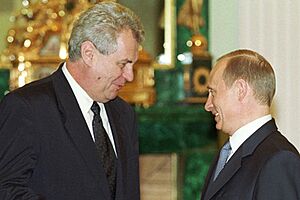
In 1998, Zeman's party won the election. He became Prime Minister of a minority government. He led the government for four years. In 2001, Vladimír Špidla replaced him as party leader. Zeman then moved to the countryside. He ran for president in 2003 but lost. He left the Social Democratic Party in 2007.
In 2009, he started a new party called Party of Civic Rights – Zemanovci. This party did not win any seats in later elections.
Presidency (2013–2023)
In 2012, Miloš Zeman announced he would run in the 2013 Czech presidential election. This was the first time Czech citizens directly elected their president. Zeman won the first round and then the second round against Karel Schwarzenberg. His term as president began in March 2013.
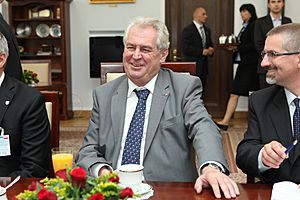
In June 2013, the government led by Petr Nečas collapsed due to a political scandal. Zeman appointed his friend Jiří Rusnok as Prime Minister. Rusnok's government was short-lived and resigned after losing a vote of confidence.
Zeman was involved in a political event in October 2013. Some members of his former party tried to remove their chairman, Bohuslav Sobotka. It was later revealed they had a secret meeting with Zeman. This caused public protests.
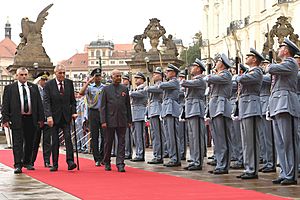
In April 2014, after Russia took over Crimea, Zeman called for strong action. He suggested that NATO forces might need to enter Ukraine if Russia expanded further. The Czech Republic joined NATO in 1999 when Zeman was prime minister.
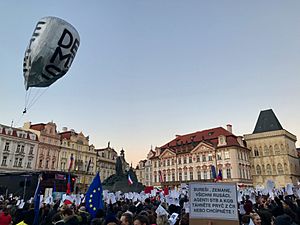
In November 2014, protests happened in Prague. People called for Zeman's resignation. They believed he was too friendly with some authoritarian governments. Protesters held red cards, like in football, to show their disapproval.
Zeman decided to run for a second term in the 2018 Czech presidential election. He won the election with 51.37% of the votes in the second round.
In July 2019, the Senate tried to bring impeachment charges against President Zeman. They said he had acted against the constitution in eight cases. These included naming ministers and interfering in court cases. However, the Chamber of Deputies rejected these charges in September 2019.
In October 2021, Zeman was hospitalized. This caused delays in forming a new government. He was discharged in November but returned to the hospital briefly after testing positive for COVID-19.
On 19 October 2022, Zeman announced he would retire from politics. His second term ended in March 2023.
After Presidency
On 19 April 2023, Zeman opened a new office in Prague 6. He said he plans to welcome visitors once a week. In April 2024, Zeman stated his wish for the next Czech government to include the ANO 2011 and Freedom and Direct Democracy parties.
Political Views
Zeman was seen as a center-left politician when he was prime minister. But as president, he became known for his views against immigration. He has been called a populist. Some have compared him to former United States president Donald Trump. Zeman supported Trump's 2016 presidential campaign.
Views on China
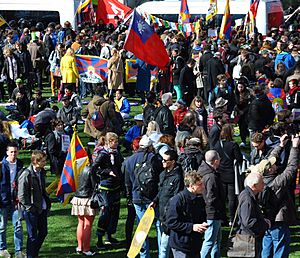
In 2014, Zeman said he wanted to learn how China "stabilized" its society. In 2016, he invited Chinese president Xi Jinping for a visit. This led to protests. Zeman appointed Ye Jianming, chairman of CEFC China Energy, as his economic adviser. This company bought many businesses in the Czech Republic.
Gun Control
In 2016, Zeman encouraged gun owners with licenses to carry their firearms. He said this could help protect people in public places. His wife also got a license to carry a concealed firearm.
European Union
Zeman has shown both support and criticism for the European Union. As prime minister, he helped the Czech Republic join the EU. He has called himself a "federalist" who supports EU membership. He also flew the flag of Europe at Prague Castle after becoming president.
Despite his pro-EU statements, Zeman supports holding a vote on Czech EU membership. This would be similar to the Brexit referendum in the United Kingdom. He also opposes the EU's rules on accepting migrants.
Environment and Climate
Like his predecessor Václav Klaus, Zeman has expressed doubts about human activity causing global warming. He has stated his opinion that human actions probably cannot influence global warming.
Views on Israel
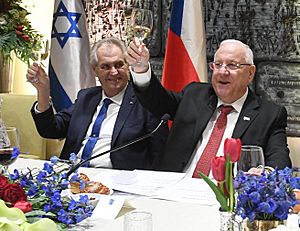
Zeman is a strong supporter of Israel. He supported the U.S. recognition of Jerusalem as Israel's capital. He also supported moving the Czech embassy to Jerusalem. Zeman ordered the Israeli flag to fly at Prague Castle to show support for Israel in 2021.
Views on Kosovo
Zeman is against having a Czech embassy in Kosovo. He has said he is against the recognition of Kosovo. He has described it as a "terror regime". While visiting Belgrade in 2014, he opposed the creation of an independent Kosovan army. He hoped Serbia would join the European Union soon.
Views on Middle East
Zeman has expressed concern about the growth of Islamic State (ISIL). He called for a united military operation against ISIL. He described Middle Eastern refugees arriving in Europe as an "organized invasion". He rejected the European Union's proposal for mandatory migrant quotas.
Zeman said that Turkey should not be in the European Union. He also accused Turkey of working with ISIL against Syrian Kurds.
United States and NATO
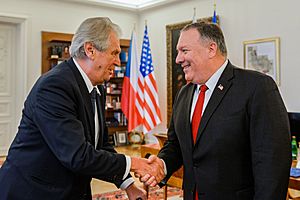
Zeman helped the Czech Republic join NATO. He has called for a vote on NATO membership, but he supports staying in the organization. In March 2015, Zeman criticized protests against a US Army convoy crossing the Czech Republic. He said: "We experienced occupation twice last century and we know what it looks like."
On 18 May 2021, Zeman apologized to Serbia for the 1999 NATO bombing. He called it a "mistake and worse than a crime".
Views on Poland
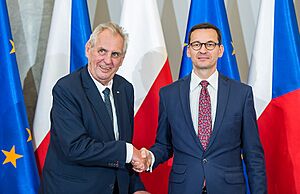
In March 2016, Zeman defended Poland's government. He said the Polish government had the right to carry out its plans. He believed the European Union should not criticize it.
Views on Russia
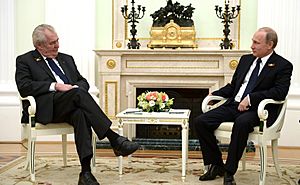
Zeman described the war in Donbas as a "civil war". He compared it to the Spanish Civil War. Regarding the annexation of Crimea by the Russian Federation, he noted that the Kosovo situation was used as an argument for Crimea's separation.
Zeman visited Moscow in 2015 for Victory Day celebrations. He said he was going to honor soldiers who died. Most other EU leaders did not attend due to the conflict in Ukraine.
In December 2019, Zeman criticized Russian protests. These protests were against the Czech decision to remember the 1968 Soviet invasion as a day for victims. He called it "absolute insolence".
In April 2021, Zeman expressed doubt about Russia's involvement in the 2014 Vrbětice ammunition warehouses explosions. He suggested it could have been an accident. Thousands protested in Prague, calling Zeman "a servant" of Russia.
In response to the 2022 Russian invasion of Ukraine, Zeman called for Russia to be cut off from SWIFT. He condemned Russia's invasion and called for strong sanctions.
Views on Ukraine
In 2015, Zeman criticized Ukraine for honoring Stepan Bandera. Bandera was a leader of the Organization of Ukrainian Nationalists (OUN). Zeman said he could not congratulate Ukraine on such national heroes.
On 7 March 2022, Zeman decided to give Ukrainian President Volodymyr Zelenskyy the highest state award of the Czech Republic. This was for "his bravery and courage" during Russia's invasion.
Personal Life
Miloš Zeman was married to Blanka Zemanová in the 1970s. They divorced in 1978. In 1993, he married Ivana Bednarčíková.
He has a son named David from his first marriage. His daughter from his second marriage, Kateřina Zemanová, was very active in his presidential campaign. Zeman asked her to be his "informal First Lady". This was because his wife prefers to avoid media attention. Zeman describes himself as a "tolerant atheist".
Zeman has faced health challenges. He has diabetic neuropathy in his feet, which sometimes requires him to use a wheelchair. In March 2024, he was hospitalized and had surgery for a blood clot in his leg. He was discharged in April 2024.
State Awards
National
 Former ex-officio Sovereign of the Order of the White Lion (2013–2023)
Former ex-officio Sovereign of the Order of the White Lion (2013–2023) Former ex-officio Sovereign of the Order of Tomáš Garrigue Masaryk (2013–2023)
Former ex-officio Sovereign of the Order of Tomáš Garrigue Masaryk (2013–2023)
Foreign
 Austria: Grand Star of the Decoration of Honour for Services to the Republic of Austria (2 March 2023)
Austria: Grand Star of the Decoration of Honour for Services to the Republic of Austria (2 March 2023) Germany: Grand Cross Special Class of the Order of Merit of the Federal Republic of Germany (5 May 2014)
Germany: Grand Cross Special Class of the Order of Merit of the Federal Republic of Germany (5 May 2014) Hungary: Grand Cross with Chain of the Hungarian Order of Merit (3 March 2023)
Hungary: Grand Cross with Chain of the Hungarian Order of Merit (3 March 2023) Israel: Recipient of the President's Medal (11 July 2022)
Israel: Recipient of the President's Medal (11 July 2022) Jordan: Grand Cordon with Collar of the Order of Al-Hussein bin Ali (11 February 2015)
Jordan: Grand Cordon with Collar of the Order of Al-Hussein bin Ali (11 February 2015) North Macedonia: Recipient of the Order 8-September (9 June 2016)
North Macedonia: Recipient of the Order 8-September (9 June 2016) Poland: Knight of the Order of the White Eagle (15 March 2016)
Poland: Knight of the Order of the White Eagle (15 March 2016) Serbia: Second Class of the Order of the Republic of Serbia (15 February 2020)
Serbia: Second Class of the Order of the Republic of Serbia (15 February 2020) Slovakia: First Class of the Order of the White Double Cross (27 May 2014)
Slovakia: First Class of the Order of the White Double Cross (27 May 2014) Slovenia: Recipient of the Order for Exceptional Merits (18 February 2016)
Slovenia: Recipient of the Order for Exceptional Merits (18 February 2016)
Images for kids
See also
 In Spanish: Miloš Zeman para niños
In Spanish: Miloš Zeman para niños
 | John T. Biggers |
 | Thomas Blackshear |
 | Mark Bradford |
 | Beverly Buchanan |


